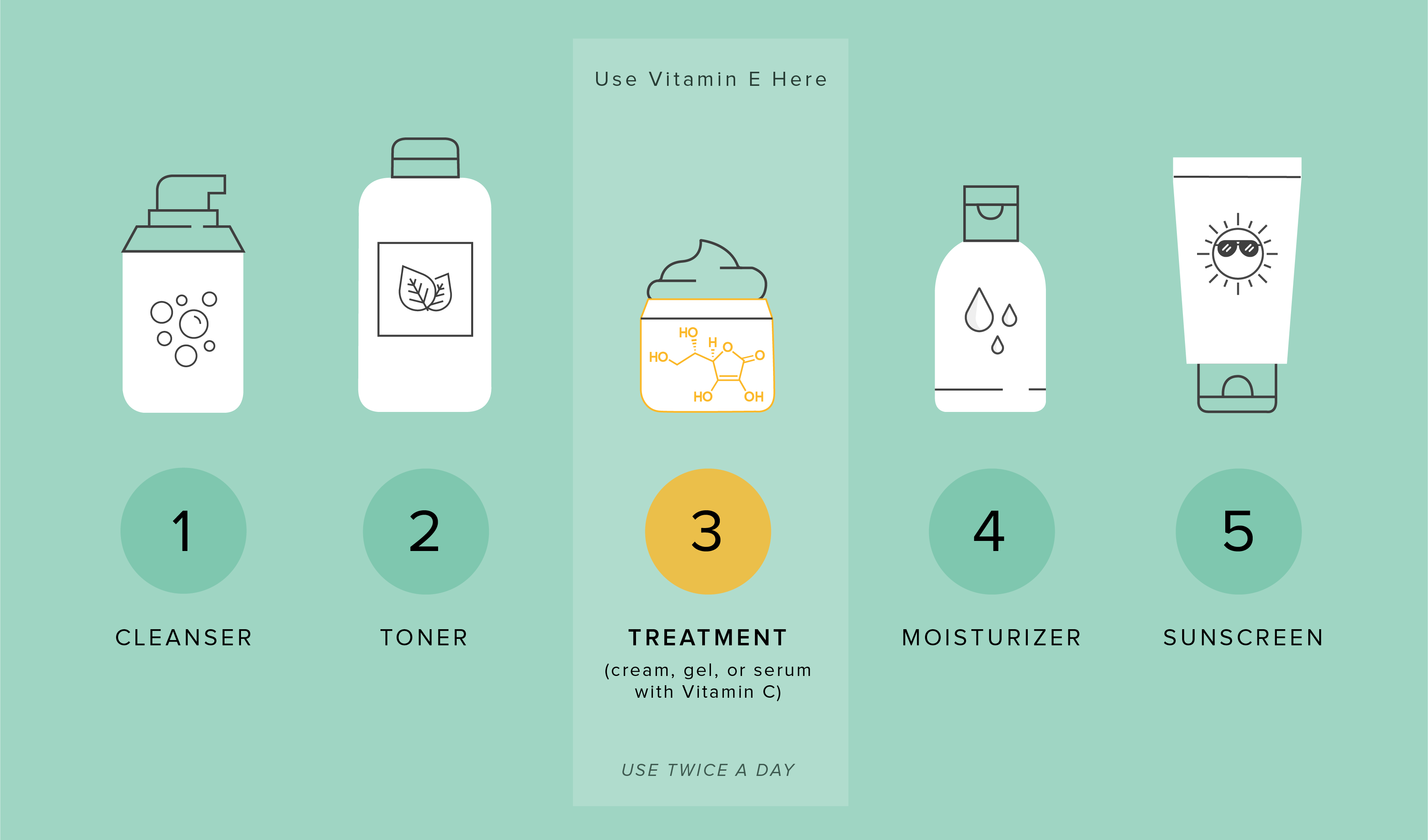Can I Mix Vitamin C And Vitamin E
- Skin Care
- Ingredients Glossary
- Vitamin E
INGREDIENT
Vitamin E Skin Care Benefits:
All You Need to Know
A longtime praised ingredient, vitamin E is a blanket term for a group of oil-soluble antioxidants (the most popular being tocopherol) and is found in many anti-aging serums and creams. Vitamin E is an OG powerhouse that fights free radical damage, prevents fine lines and wrinkles, moisturizes the skin, and evens out skin tone. Vitamin E is also a photoprotectant meaning it has natural capabilities to protect your skin against certain UV rays (PSA: it's not a replacement for sunblock, but it will strengthen your sunscreen). Vitamin E actually occurs naturally in the skin, but we lose these natural concentration levels as we age (bleh) making topical application critical for any anti-aging skin care regimen. The one downside to vitamin E is this ingredient can trigger breakouts if you have acne prone skin and/or can cause irritation if you apply the product incorrectly. If your skin reacts poorly to vitamin E, you can always eat foods rich in vitamin E (like avocados, almonds, sweet potatoes, sunflower seeds, whole grains, trout, olive oil, spinach, and more!) to capture some of the skin care benefits.


Anti-Aging
Dryness
Fine Lines & Wrinkles
Redness


Combo
Dry
Normal


Creams
Eye Creams
Masks
Moisturizers
Oils
Serums


Over the Counter
Top 7 Vitamin E Skin Care Benefits
✓ Prevents Fine Lines & Wrinkles
ANTI-AGING. YES PLEASE.
Vitamin E prevents fine lines and wrinkles by encouraging skin cell turnover and protecting collagen from deteriorating (remember: the loss of collagen over time is a major cause of fine lines and wrinkles). Unfortunately, vitamin E cannot remove existing fine lines and wrinkles, but vitamin E does prevent premature development of new fine lines/wrinkles--and we're all about it.
✓ Strenghtens Sunscreen
PROTECT YOUR SKIN
Vitamin E makes sunscreen stronger, but to understand why, we need to talk about UV rays. There are two types of UV rays—UVB and UVA rays—and both suck for skin. UVB rays are shorter rays responsible for sunburns (UVB for burn), and UVA rays are longer rays that penetrate deeper layers of skin for lovely things like DNA damage and at worst, skin cancer (UVA for aging). Vitamin E combats UV rays in 2 ways: it can actually absorb/neutralize UVB rays, and vitamin E's antioxidant properties fight free radical damage caused by both UVB and UVA rays. Vitamin E will enhance your sunscreen's UV protection, but FYI, it is NOT a replacement for sunscreen.
✓ Seals in Hydration
STRENGTHENS SKIN'S PROTECTIVE BARRIER
Vitamin E is well absorbed by the skin as a moisturizer and protects the skin's lipids and cell membranes. Vitamin E both seals in moisture (prevents existing hydration from leaving) and improves the skin's ability to bond with new water molecules (great for rough, dry, or damaged skin). Healthy lipids makeup healthy skin cell membranes, which ultimately means a strong hydration barrier. The added benefit is hydrating every day keeps the wrinkles away.
✓ Prevents Scar Tissue
SKIN HEALER
Vitamin E has been long time favorite for preventing keloids (extra, raised scar tissue) from developing after burns and injury; however, contrary to popular belief, vitamin E has not been clinically proven to lighten existing scars.
✓ Fights Free Radical Damage
ANTIOXIDANT PROPERTIES
Sparknotes: Vitamin E is an amazing anti-aging ingredient that fights free radical damage with it's antioxidant properties (reminder: free radicals are caused by sun damage, pollution, chemicals, and environmental toxins and we hate them for prematurely aging our skin--fine lines and wrinkles, sagging, and age spots--and at worst, causing skin cancer...yikes). As an electron donor, Vitamin E is a free radical scavenger that locates and stabilizes free radicals in the skin.
Down the rabbit hole: What is free radical damage, actually? Free radicals are unstable cells that are missing an electron and are thirsty to refill that missing electron. They are harmful because they go full-blown psycho and steal electrons from literally anything around it (from connective tissue, DNA, cell membranes). When a free radical steals an electron, it's now satisfied and chills out, but the cell it stole from now is now missing an electron, gets out of whack, becomes a free radical itself, and the whole process of molecular damage repeats itself… Antioxidants, like vitamin E, are peacemakers that come in with extra electrons and give their extra electrons to the desperate free radicals—a.k.a. a critical to defense against premature aging.
✓ Brightens Complexion
GET THE JLO GLOW
Vitamin E says no more dull and tired; here for bright and shiny. Vitamin E brightens and smooths the skin, so you can get that J.Lo glow—the combo of faster skin cell regeneration, boosted collagen, plump hydration, and evened skin tone gets your skin turned up a level.
✓ Reduces Redness
ANTI-INFLAMMATORY PROPERTIES
Vitamin E is an antioxidant with anti-inflammatory properties that reduce redness (as well as mild rosacea and inflammation). Vitamin E also strengthens blood vessels, minimizes the appearance of broken capillaries, and stimulate blood circulation.
When to Use Vitamin E
SKIN CARE ROUTINE OPTION:
A serum, cream, or gel with vitamin E - apply in the AM for photoprotection against UV rays, and in the PM to fight free radicals while you sleep.

Top 3 Vitamin E Skin Care Products
We've put together a GHS curated selection of our favorite skin care products that contain vitamin E (tocopherol) for anti-aging, dryness, calming redness, and reducing fine lines and wrinkles. We only link to products that we absolutely believe in. All the products we've chosen are paraben-free, sulfate-free, and phthalate-free. Remember - results won't happen overnight. It will take 6-8 weeks of consistent topical use before you begin to see improvements, so stay consistent with your product usage.
USE AS FINAL STEP
Apply a few drops of this oil to your face and neck after you apply moisturizer in the AM or PM.
PRICE: $
CERTIFIED: paraben-free, sulfate-free, phthalate-free, organic, cruelty-free, vegan, gluten-free
USE AS FINAL STEP
Apply a few drops of this oil to your face and neck after you apply moisturizer in the AM or PM.
PRICE: $$$
CERTIFIED: paraben-free, sulfate-free, phthalate-free, cruelty-free, vegan, gluten-free
USE IN AM
After cleansing, exfoliating, and toning, apply this serum morning and night. Follow up with a moisturizer.
PRICE: $$$$
CERTIFIED: paraben-free, sulfate-free, phthalate-free
How to Apply Vitamin E

Always patch test before applying to your entire face! Apply small amount of vitamin E product to a small area on your forehead (where your facial skin is thickest). If there is no irritation within 24 hours, apply thin layer of vitamin E product to your entire face.


Vitamin E works best when applied to your entire face (avoid eyes, lips, and mouth) because it fights free radicals and seals moisture in your skin.


For maximum results, let your vitamin E product fully dry before the next step in your skin care routine. FYI, applying moisturizer immediately after vitamin E can prevent your skin from completely absorption.


Pair with vitamin C to fight free radicals. Vitamin E and vitamin C can both fight free radical damage on their own, but together, vitamin E and vitamin C are free radical fighting soulmates—they actually increase their individual power/potency when working together. Why? Vitamin E and vitamin C are a double trouble duo because vitamin C "recharges" vitamin E (literally gives Vitamin E new life). For those who care about the dirty details, after Vitamin E gives its extra electron to a free radical, vitamin C gives its extra electron to vitamin E. Then vitamin E can give another electron away to another free radical.
Vitamin E is also better absorbed when combined with vitamin C. Vitamin C works best on the surface level, whereas vitamin E is oil-soluble meaning it can go one deeper. 
GHS Tips
Look for Tocopherol 👀
Tocopherol is the most effective and the most researched form of topical vitamin E.

Don't Start with 100% Vitmain E Oil
If you're getting started with vitamin E, do not use pure vitamin E oil. For some beauties, pure vitamin E oil can cause dermatitis type reactions (think inflamed, red, itchy, rash), and pure vitamin E oil does not mix will with oily or acne-prone skin. Try vitamin E blended into products with vitamin C, and if you really want to get a higher concentration of vitamin E, you can try the pure oil, but make sure you patch test beforehand.

No 100% Vitamin E Oil on Oily/Acne-Prone Skin
Because vitamin E is oil-soluble, vitamin E in pure oil form can get deep into pore and cause breakouts in oily or acne-prone skin. If you have oily/acne-prone skin, use a product that combines vitamin E (normally listed as tocopherol) with other ingredients—preferably vitamin C.

For Dry Skin, Pair with Argan Oil or Olive Oil
Pure vitamin E oil (after patch tested) can do wonders to moisturize dry skin, but pure Vitamin E oil is very sticky/annoying to apply. Mix pure vitamin E oil with an argan oil or olive oil (both of these oils are high in oleic acid—great for dry skin) to still moisturize without the sticky mess.

Go Natural
Research shows that natural forms of vitamin E are more effective than their synthetically derived stepsisters. Natural forms of vitamin E will start with "d" (d-tocopherol) and synthetic forms will start with "dl" (dl-tocopheryl). Also, look for tocopherol vs. tocopheryl. The problem issue is most brands don't say whether they use natural or synthetic vitamin E on the ingredient list—they just generically list "tocopherol". If you really want to know if it's natural or synthetic, you'll have to contact the company to find out.

Apply to Burns and Skin Wounds
Vitamin E helps the skin heal, especially burns. In fact, vitamin E is applied to burn victims to aid the healing process and prevent development of keloids (raised scar tissue).

Follow Up With...

Moisturizer
Moisturize 2x a day (morning and night). Vitamin E works hard for your skin, but all that progress can be for nothing if you don't properly hydrate. Dried out skin can reverse all that vitamin E goodness.

Sunscreen
Apply sunscreen daily. Vitamin E does offer photo protection and strengthens sunscreen, but it is absolutely NOT a replacement.
Safety Tips
Vitamin E is Cosmetic Ingredient Review approved and is safe for topical use in skin care products. Look for concentrations of 0.5%-2.5% for maximum vitamin E skin care benefits.
SIDE EFFECTS: irritation, itchiness, or breakouts
✓ Apply vitamin E under sunscreen (makes it stronger)
✓ Combine with vitamin C for maximum results (lots of products mix the two)
✓ Eat fruits & veggies high in vitamin E
• Don't use vitamin E if you have oily, acne prone, or very sensitive skin
• Don't use vitamin E in its pure form around your eyes
FAQs about Vitamin E
Q. Do vitamin E serums or oils fade dark spots and hyperpigmentation?
Contrary to popular belief, vitamin E is actually not a choice ingredient to fade hyperpigmentation. Because vitamin E can reduce the development of keloids (extra, raised scar tissue) on new wounds (burns especially), many anecdotally believe vitamin E is able to fade dark spots on the skin; however, fading hyperpigmentation and healing wounds are different. Vitamin E stimulates blood circulation and protects/repairs skin cell membranes--both of which help heal wounds. Wounds that heal better, scar less and scar lighter. All in all, vitamin E does not actually lighten the scars; it aids the healing process so darker scars never develop. So, if you're working on fading existing hyperpigmentation, check out other ingredients like arbutin, azelaic acid, AHAs (i.e. glycolic acid or lactic acid), or vitamin C.

Q. Can vitamin E serums or oil lighten skin?
No, vitamin E is not a skin lightening (as in whitening) agent and therefore, it cannot lighten your skin. If hyperpigmentation is a top concern for you, we recommend trying a product with arbutin, azelaic acid, AHAs (i.e. glycolic acid) or vitamin C.

Q. What is the difference between vitamin C and vitamin E?
Like vitamin E, vitamin C is also an antioxidant meaning both vitamins fight free radical damage caused by UV rays, toxins, pollution, and environmental damage. Where they differ (in a big way) is vitamin E is oil-soluble (oily and acne prone, beware) whereas vitamin C is water-soluble (great for all skin types). Another difference is how the two combat free radicals. Vitamin C can donate electrons to multiple free radicals, but vitamin E is a one and done--when it gives its extra electron to a free radical, it can't give to another free radical in need of some electron TLC. BUT, when used together, vitamin C can reinforce used up vitamin E by replenishing these babies with another electron to give away and keep on going (and going and going like an energizer bunny free radical fighter).

Q. Can I use vitamin E with vitamin C?
YES! Using vitamin E and vitamin C together makes both ingredients stronger. 100% let these two skin care soulmates live on your face together.

Q. Are vitamin E serums or oils bad for acne or oily skin? Can vitamin E serums or oil cause acne?
Yes… vitamin E serums or oils can definitely cause breakouts. If you are acne prone or have oily skin, stay away from vitamin E (unless you have patch tested your vitamin E product and did not get a zit storm). Vitamin E is oil-soluble meaning it can seep deep through the natural oil nested in pores and hangout down yonder. Anything that's oil-soluble can trigger breakouts in those blessed with oily/acne prone skin (we say blessed because even though oily skin can be annoying, oily skin doesn't wrinkle-crinkle as easily as dry skin…).

Q. Will vitamin E serums or oil help with wrinkles?
Vitamin E cannot remove existing fine lines and wrinkles, but vitamin E does prevent premature development of new fine lines/wrinkles by fighting free radicals and sealing in moisture within your skin, strengthening your skin's protective barrier.

Q. Do vitamin E serums or oil expire?
Yes. Look for the expiration date or a POA (prescribed period after opening) which tells you how long the product is good after it's been opened.
If your vitamin E product has expired, do not use it - expired products can cause skin irritation, bacterial infection, or breakouts.

Q. What are common brand names used to identify vitamin E on an ingredient list for skin care products?
- Vitamin E
- Tocopherol
- D-alpha-tocopherol
- D-alpha-tocopherol acetate
- Dl-alpha tocopherol
- Dl-alpha tocopherol acetate

Want More GHS Tips?
It'll be the best thing to ever slide into your DM's.
Can I Mix Vitamin C And Vitamin E
Source: https://gethealthyskin.com/ingredients/vitamin-e-tocopherol







Tidak ada komentar:
Posting Komentar